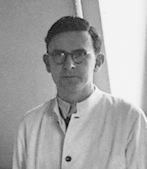Niels Kaj Jerne facts for kids
Quick facts for kids
Niels Kaj Jerne
|
|
|---|---|

Niels Kaj Jerne in 1950
|
|
| Born | 23 December 1911 London, UK
|
| Died | 7 October 1994 (aged 82) Castillon-du-Gard, France
|
| Nationality | Danish |
| Known for | Monoclonal antibodies |
| Awards |
|
| Scientific career | |
| Fields | Immunology |
Niels Kaj Jerne (born December 23, 1911 – died October 7, 1994) was a Danish scientist. He was an immunologist, which means he studied the body's immune system. This system protects us from diseases.
In 1984, Jerne won the Nobel Prize in Physiology or Medicine. He shared it with two other scientists, Georges J. F. Köhler and César Milstein. They won for their ideas about how the immune system works. They also won for finding a way to make special monoclonal antibodies.
Jerne is famous for three big ideas about the immune system:
- First, he thought that our bodies already have the right antibody to fight germs. He believed the body doesn't just make them when a germ appears.
- Second, he suggested that the immune system learns to accept the body's own cells. This learning happens in a special organ called the thymus.
- Third, he knew that different immune cells, like T cells and B cells, talk to each other. He helped us understand how they communicate.
Early Life and Education
Niels Kaj Jerne was born in London, UK, in 1911. His family had lived on a small Danish island for many years. But his parents moved to London before he was born.
During the First World War, his family moved to the Netherlands. Niels grew up in a city called Rotterdam. He first studied physics at Leiden University. After two years, he moved to Copenhagen, Denmark. There, he changed his studies to medicine.
He finished his medical degree in 1947 at the University of Copenhagen. Four years later, he earned his doctorate. This is a very high academic degree.
Research and Discoveries
From 1943 to 1956, Jerne worked at the Danish National Serum Institute. During this time, he developed his important ideas about how antibodies are made. People say he got his big idea while riding his bicycle home in Copenhagen.
His ideas about antibodies made him famous around the world. In 1956, Jerne started working for the World Health Organization (WHO) in Geneva. He led the sections for biological standards and immunology. He worked there for six years.
In 1962, he moved to the United States. He became a professor at the University of Pittsburgh. He taught Microbiology there for four years. He also continued to advise the WHO on immunology.
Jerne returned to Europe in 1966. He became a professor in Frankfurt, Germany. He also directed the Paul-Ehrlich-Institut. In 1969, he moved to Basel, Switzerland. He became the director of the Basel Institute for Immunology. He stayed there until he retired in 1980.
During the 1970s and 1980s, Jerne was a leader in developing the "immune network theory." This theory explains how all the parts of the immune system work together. Jerne was known for his theories, not for doing experiments himself. His Nobel Prize was given for his ideas.
Family Life
Niels Jerne was married three times. He had two sons, Ivar and Donald, with his first wife, Tjek Jerne. Later, he had a third son, Andreas, with Gertrud Wettstein.
Awards and Honors
Niels Kaj Jerne received many awards and honors for his work. These show how important his contributions were to science.
He received the:
- Marcel Benoist Prize (1978)
- Paul Ehrlich and Ludwig Darmstaedter Prize (1982)
He also received special honorary doctorates from several universities:
- University of Chicago (1972)
- Columbia University (1978)
- University of Copenhagen (1979)
- University of Basel (1981)
- Erasmus University Rotterdam (1983)
He was also a member of many important scientific groups:
- Foreign Honorary Member of the American Academy of Arts and Sciences (1967)
- Member of the Royal Danish Academy of Sciences and Letters (1969)
- SSI Honorary Member (1970)
- Foreign Associate of the National Academy of Sciences (1975)
- Foreign Member of the American Philosophical Society (1979)
- Elected a Fellow of the Royal Society (FRS) in 1980
- Member of the Académie des Sciences (1981)
See also
 In Spanish: Niels Kaj Jerne para niños
In Spanish: Niels Kaj Jerne para niños
 | Stephanie Wilson |
 | Charles Bolden |
 | Ronald McNair |
 | Frederick D. Gregory |

